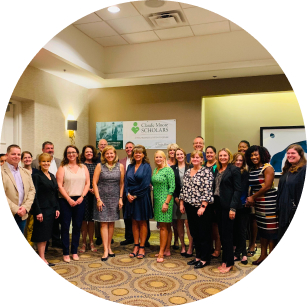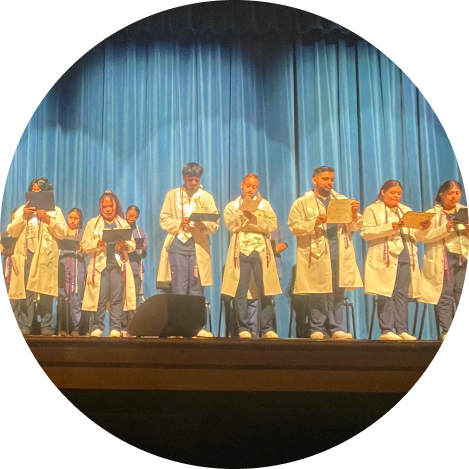

Career trajectories are not linear. Nor is it reasonable to expect an individual to stay in one job for a lifetime. CMO supports programs that create effective pathways for skill development, growth, and advancement; allowing individuals to smoothly transition between school, initial work, and various career changes. We call this concept the Workforce Highway because it’s a journey with various stops and destinations.
The Workforce Highway concept is based upon the monumental work of the Claude Moore Scholars Program that explored the relationship between health workforce shortages across Virginia and health disparities between populations and health outcomes. This program enables young people to pursue diverse and sustainable health science careers in over 50 school divisions.
The highway promotes continual learning, beginning with early engagement in middle school and continuing throughout with professional education. It also facilitates on and off ramps as students transition between school and work for upskilling and career change, while contributing to the economic development in local communities.


Claude Moore Scholars is a workforce development program that prepares Virginia high school students for high-demand, entry-level healthcare careers. By combining early education intervention with real-world career exposure, the program expands students’ opportunities and perspectives—particularly in underserved communities—while building a stronger, more equitable healthcare workforce for the future.
Manassas Park High School in Manassas Park, Virginia launched its first Claude Moore Scholars Certified Nursing Assistant (CNA) program during the 2023-2024 school year. This first cohort of students completed the required clinical hours for certification at the Capital Caring facility in Aldie, Virginia. It is one of the nation’s oldest and largest non-profit providers of hospice and palliative care. All the students surpassed their written exams with a 100% score and several students were hired by Capital Caring. All graduates are pursuing further education and training in nursing.
The Mason Center for Health Workforce was created to advance the mission of the Claude Moore Scholars program by supporting health workforce development across Virginia. The Center collects and analyzes data on health workforce needs and enhances education and training through a robust learning management system. This platform provides curriculum support for teachers, including instruction in 21 of the 23 Career and Technical Education “career readiness skills.”
Beyond education, the Center acts as a statewide catalyst—leveraging George Mason University’s expertise to support research, community planning, and the development of innovative public-private strategies in both physical and behavioral health career pathways. From entry-level education to post-graduate skill-building, the Center supports career progression and workforce sustainability. It also serves as a technical assistance hub for program evaluation, policy analysis, and workforce planning for agencies, academic institutions, and professional organizations.
Claude Moore Opportunities is a trusted leader in advocating funding and systemic change to strengthen Virginia’s workforce, especially in high-demand fields like healthcare and behavioral health. We bring together government leaders, employers, educators, and nonprofits to build clear, equitable pathways to good jobs for all Virginians, particularly those who are under-resourced. Through research, surveys, and cross-sector collaboration, we work to identify the root causes of workforce challenges and develop practical, community-driven solutions. For example, as many families across Virginia faced rising rates of food insecurity, job loss, and financial instability, Claude Moore led the development of a strategic plan to strengthen the human services workforce, assuring more frontline behavioral health professionals are trained and ready to serve.
Working alongside the Virginia Secretary of Labor and over 50 workforce partners, we created a statewide roadmap to grow talent pipelines in health science careers. This guidebook helps employers, nonprofits, and educators launch and scale regional sector partnerships for workforce development. In addition, Claude Moore regularly advises state agencies and lawmakers on regulatory barriers that limit workforce growth. One recent recommendation included creating new certifications that allow undergraduates to begin working under the supervision of licensed mental health professionals, helping to expand Virginia’s behavioral health workforce through our Youth Mental Health Initiative.
As part of the Virginia Partnership for Health Science Careers (VPHSC), educators, employers, and economic developers across Virginia are working together to create practical education and workforce pathways. These efforts aim to meet the growing demand for health science professionals, support regional economic growth, and connect students with meaningful careers in healthcare and life sciences. The partnership is modeled after the Blue Ridge Partnership for Health Science Careers, which began in 2019, and now works with all nine GO Virginia Regions to strengthen the healthcare workforce in their regions.
The Blue Ridge Partnership for Health Science Careers is a collaboration of educators, employers, and economic development professionals in the Roanoke and New River Valleys, the Alleghany Highlands, and the greater Lynchburg region. As members of GO Virginia Region 2, they are committed to improving health sciences education and aligning instruction to meet the workforce needs of the region’s health employers, including hospitals, health systems, long-term care facilities, and emerging biomedical companies. The Partnership uses a new model for health sciences education and workforce development to:
The BRPHSC model aligns with the region’s economic development and job growth goals to establish practical talent pathways, meet employer needs, promote entrepreneurship, and provide meaningful health careers. The model also partners with K-12 public schools within that region to create pathways for students to explore and build career pathways for a lifetime.
Claude Moore Opportunities is leading a statewide effort to help military medics and corpsmen transition into meaningful civilian healthcare careers in Virginia. With the Commonwealth facing a projected shortage of 19,000 healthcare workers over the next decade—and as home to over 600,000 veterans and the third-largest population of active-duty service members—this initiative addresses both a critical workforce gap and a powerful opportunity to support those who have served.
Despite their advanced medical training and leadership experience, many medics and corpsmen face significant barriers when leaving the military, including difficulty translating military credentials to civilian roles, regulatory obstacles, and limited access to well-paying jobs in their field. To address these challenges, Claude Moore Opportunities convened a statewide summit in March 2025, bringing together employers, educators, government agencies, and veteran service organizations to identify solutions. The resulting strategies include launching regional pilot programs, developing bridge training opportunities, and using AI tools to better match veterans’ military experience with healthcare roles in the civilian workforce.
Claude Moore is collaborating with George Mason University’s Center for Community Mental Health and Rappahannock Community College to launch a pilot Youth Mental Health Corps program. This initiative aims to tackle the youth mental health crisis by expanding community support, education, and training—ultimately encouraging more individuals to pursue careers in behavioral health. Through this pilot, undergraduate participants will gain the necessary training and credentials to become registered Behavioral Health Technicians (BHT) or Qualified Mental Health Professionals (QMHP-T), while also learning how to effectively support youth within school environments.
Across Virginia, partnerships between community colleges, service providers, and schools are strengthening the healthcare workforce and addressing critical shortages in behavioral health and emergency services.
Germanna Community College and the Rappahannock Community Services Board created an innovative “Earn While You Learn” program to train and credential Behavioral Health Technicians—a role recently established by law. Students receive paid work experience while completing coursework, with many continuing their education or employment in behavioral health.
Rappahannock Community College serves Northern Neck and Peninsula regions, offering health programs with licensing and dual enrollment opportunities. Its Emergency Medical Technician program at the Bridging Communities Technical Center achieved a 100% pass rate in 2023–2024, adding vital healthcare professionals to rural communities.






703-934-1147 | 11350 Random Hills Road, Suite 730, Fairfax, VA 22030
© 2025 Claude Moore Opportunities. All rights reserved. | FEIN Number: 93-2591379